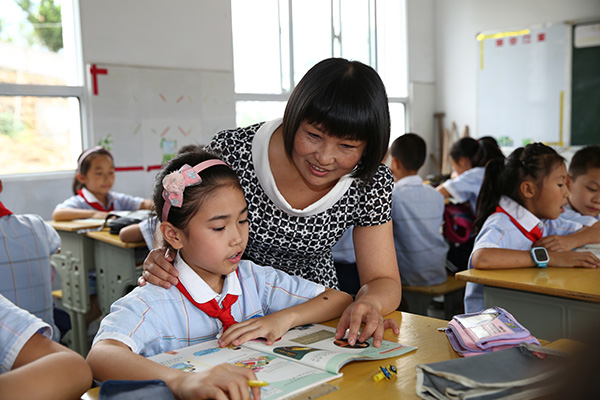The finishing school
By Wang Ru and Liu Kun | China Daily | Updated: 2019-03-25 07:58

Mother, teacher and 'sister' to the charity she set up in 2005, Liu Faying has helped thousands of poor students to complete their education, Wang Ru and Liu Kun report.
In 2015, Liu Faying, a Chinese teacher and organizer of a charity project she started in Hubei province, received a message through her website from a man offering to help impoverished students to complete their education.
The sender asked for information about the students and said he was interested in offering financial support, and Liu guided him to the information he required on her website.
In less than 10 days, the man surnamed Dai from East China's Jiangsu province had donated 230,000 yuan ($34,254) to help 12 young people to complete their studies through the website.
Not long after, middle school student Liu Haocheng-who lived with his disabled father in a dilapidated house in Changyang Tujia autonomous county of Yichang city, Hubei province-became one of the lucky recipients of Dai's donations. His mother had left home not long after he was born, and his father was later disabled in a mining accident, which prevented him from working.
"I spent almost half a year looking through websites offering to help impoverished students and tried to support students on some of them. But I found Liu Faying's website to be the most trustworthy for its openness and transparency," says Dai.
Liu is a 49-year-old deputy head of a primary school in Changyang county. She has been engaged in the public welfare effort for more than 14 years, ever since she started to use the online name Sister Yingzi to raise money for impoverished students in 2005.
Over the years, Liu and her team have paid thousands of visits to the homes of poor students to identify their specific difficulties, and posted details of their situation on their website. Potential donators can check the information and choose which students they want to help by browsing through the website. When students receive the money, they are required to contact the donators immediately to tell them how much they received. A legal adviser in Liu's team also conducts spot tests to check if the money has been sent in full to the students assigned.
Once the donation is completed, Liu updates information about it online, including the amount of money, the donator's online name and the receiver's name. By typing in the name of a donator or student on the website, contributors see how their donations are being used. Liu also puts down all of the information in her notebook, allocating a specific number to each student.
She encourages the students to keep in contact with their donators, by sending them greetings during festivals and announcing good news when they get good grades in exams.
The one-to-one model may seem to be inconvenient, but it has won the trust of many donators. Dai even donated 2 million yuan to establish a Sister Yingzi Scholarship Fund in 2016 to reward poorer students who make good achievements in their schoolwork based on his trust for Liu and her systematic approach to her undertakings.
To further dispel doubts from other netizens, she discloses her personal information online, including her name, school and telephone number.
According to Liu, she has now helped over 1,900 donators from a dozen countries to support more than 3,300 students. The amount of money donated has reached 20.6 million yuan.
























